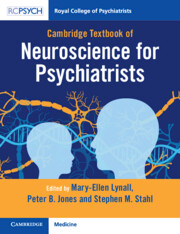Book contents
- Cambridge Textbook Of Neuroscience for Psychiatrists
- Reviews
- Cambridge Textbook of Neuroscience for Psychiatrists
- Copyright page
- Contents
- Contributors
- Introduction
- 1 Cells
- 2 Neurotransmitters and Receptors
- 3 Basic Techniques in Neuroscience
- 4 Neuroanatomy
- 5 Neural Circuits
- 6 Modulators
- 6.1 The Hypothalamic–Pituitary (Neuroendocrine) Axis
- 6.2 The Stress Response and Glucocorticoids
- 6.3 Adrenal Steroids
- 6.4 Inflammation and Immune Responses
- 7 Genetics
- 8 Neurodevelopment and Neuroplasticity
- 9 Integrated Neurobiology of Specific Syndromes and Treatments
- 10 Neurodegeneration
- Index
- References
6.3 - Adrenal Steroids
from 6 - Modulators
Published online by Cambridge University Press: 08 November 2023
- Cambridge Textbook Of Neuroscience for Psychiatrists
- Reviews
- Cambridge Textbook of Neuroscience for Psychiatrists
- Copyright page
- Contents
- Contributors
- Introduction
- 1 Cells
- 2 Neurotransmitters and Receptors
- 3 Basic Techniques in Neuroscience
- 4 Neuroanatomy
- 5 Neural Circuits
- 6 Modulators
- 6.1 The Hypothalamic–Pituitary (Neuroendocrine) Axis
- 6.2 The Stress Response and Glucocorticoids
- 6.3 Adrenal Steroids
- 6.4 Inflammation and Immune Responses
- 7 Genetics
- 8 Neurodevelopment and Neuroplasticity
- 9 Integrated Neurobiology of Specific Syndromes and Treatments
- 10 Neurodegeneration
- Index
- References
Summary
This chapter focuses on the observations that variations in adrenal steroid levels, particularly cortisol, contribute to psychopathology and major depression in particular. The associations are complex due to clinical heterogeneity together with physiological and genetic variations, influencing corticoid production, function and activation by environmental adversities. There is evidence that genetic differences in adrenal function, the impact of chronic early adversity, excess corticoid production or exogenous corticoids each contribute to the risk of depression, delay in clinical recovery and relapse. Further, psychiatric illnesses, mainly but not exclusively depression, may induce changes in corticoid activity. Elevated corticoids can affect psychological function, in particular reduced memory acuity for recall of and emotional responses to life experiences.
- Type
- Chapter
- Information
- Cambridge Textbook of Neuroscience for Psychiatrists , pp. 307 - 315Publisher: Cambridge University PressPrint publication year: 2023

